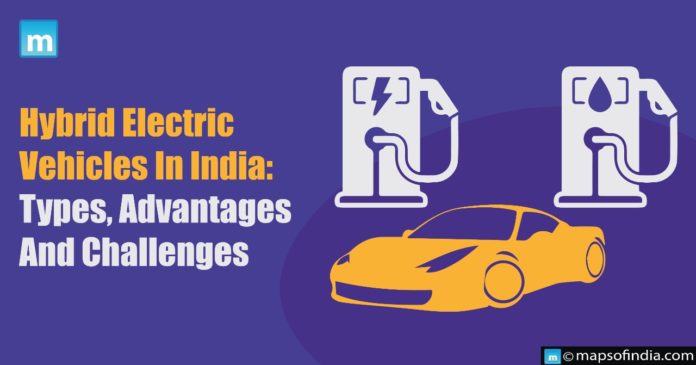Three major automobile companies, Maruti Suzuki, Toyota, and Honda, have recently launched one-of-a-kind “hybrid vehicles in the Indian market”. These new hybrid electric vehicles rely on hybrid technology and its benefits over conventional internal combustion engines (ICE).
Engines used by consumers nowadays consist of either diesel combustion engines or petrol combustion engines. These regular engines fall under the internal combustion engine. These hybrid electric vehicles can change car buyers’ minds and force them to switch to hybrid electric vehicles. In 2022, 23% of the population took place globally.
What are Hybrid Electric Vehicles (HEV)?
Hybrid electric vehicles are a combination of electric vehicles and conventional vehicles. On the other hand, hybrid electric vehicles have taken electric motors from electric vehicles and, on the other hand, taken internal combustion engines (ICE) from conventional vehicles. Due to this mixed feature of two vehicles, it is called a “Hybrid”.
A hybrid electric vehicle is powered by an electric motor, which uses energy stored in batteries by the internal combustion engine, or both. As per the situation, the vehicle shifts from the motor to the engine or the engine to the motor. These hybrid vehicles drive their energy from battery power.
Types of Hybrid Electric Vehicles (HEV)
There are three types of hybrid electric vehicles, depending on the size.
1. Full hybrid electric vehicle
2. Mild hybrid electric vehicle
3. Micro electric vehicle
4. Plug-in hybrid electric vehicle
1. Full hybrid electric vehicle
As the name suggests, this vehicle consists of larger batteries and a more powerful electric motor. The vehicle can cover a longer distance using its electric mode. As the vehicle runs on an electric motor most of the time, more battery fuel economy will occur.
Because of the large battery and more powerful electric vehicle, it costs more. Due to this, it has become a little pricey for people.
2. Mild electric vehicles
Compared to a complete hybrid electric vehicle, it can not be driven using the electric motor alone. These vehicles require a motor as well as a battery. The vehicle uses the battery at traffic lights.
3. Micro hybrid electric vehicle
Micro-hybrid electric vehicles do not offer electric torque assistance. Due to the motor’s small size, the vehicle lacks a stop-start system and energy management functions.
4. Plug-in hybrid electric vehicles (PHEVs)
This type of vehicle can be charged using a wall outlet. The vehicle consists of an onboard charger and a charging port. Plug-in hybrid electric vehicles are more potent than full hybrid electric vehicles. They rely entirely on the electric motor.
Once the battery gets drained, they ultimately switch to an internal combustion engine.
Advantages of using hybrid electric vehicles
1. Fuel efficiency
Due to the hybrid nature of the vehicle, fuel efficiency will be increased. It does not cost much for fuel, as it is pocket-friendly. In turn, this feature will help to reduce the cost of diesel and petrol in the market.
2. Saves energy
The unique feature of automatic start and stop saves energy for the vehicle. When the vehicle is at a traffic signal, the engine stops automatically. The vehicle starts again by pressing the accelerator.
3. Minimum emission
One of the biggest advantages of using hybrid vehicles is that they run on fuel and battery power, giving better gas mileage. Using environmentally friendly vehicles emits less pollution.
Instead of pollution, plug-in vehicles emit only water vapour and warm air.
4. Reduction in size and weight
Hybrid vehicles are built from light components that do not carry much weight. Light-weight vehicles are beneficial for smooth running. On the other hand, a smaller and lighter engine saves energy.
Challenges of hybrid technology
1. High vehicle costs
The most giant loophole in the hybrid electric vehicle is the high cost. Hybrid vehicles are much more expensive than regular vehicles that run on diesel and petrol. The maintenance cost is also high due to the two engines and a battery.
According to the report of Green Car, “the batteries of hybrid cars get changed rarely. But if the battery demands replacement, it will be an expensive deal”.
2. Less mileage
Hybrid cars run on two engines. One which is based on gas is smaller in size. The gasoline engine does not contribute much to the vehicle. The engine provides less power to the vehicle, which is unsuitable for long drives.





